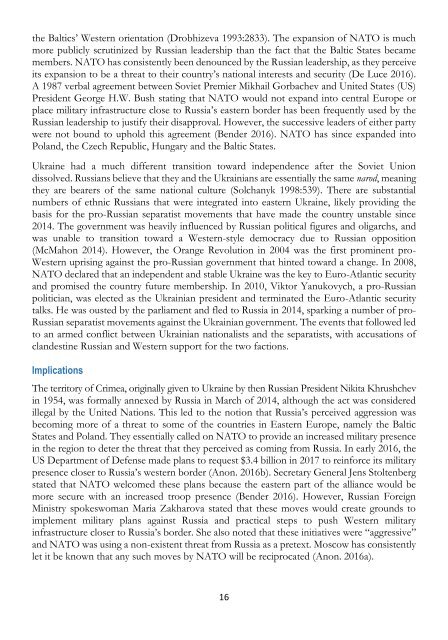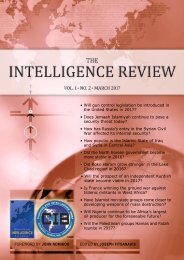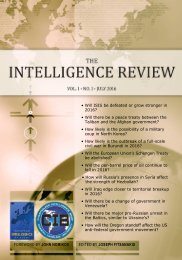The Intelligence Review | vol. 1 | iss. 1 |
This volume is the product of a collaboration between the European Intelligence Academy (EIA) and the Chanticleer Intelligence Brief (CIB), a student-run initiative supported by the Department of Politics at Coastal Carolina University in Conway, South Carolina, United States. Eleven CIB analysts tackle some of the most pressing and timely questions confronting intelligence observers today. Topics range from the price of oil to political stability in Venezuela, from the territorial cohesion of Iraq to the future of the Islamic State, and many other pressing subjects that feature daily in news headlines. CIB analysts propose carefully crafted and informed forecasts that outline future developments in some of the world's most unpredictable hot spots.
This volume is the product of a collaboration between the European Intelligence Academy (EIA) and the Chanticleer Intelligence Brief (CIB), a student-run initiative supported by the Department of Politics at Coastal Carolina University in Conway, South Carolina, United States. Eleven CIB analysts tackle some of the most pressing and timely questions confronting intelligence observers today. Topics range from the price of oil to political stability in Venezuela, from the territorial cohesion of Iraq to the future of the Islamic State, and many other pressing subjects that feature daily in news headlines. CIB analysts propose carefully crafted and informed forecasts that outline future developments in some of the world's most unpredictable hot spots.
- No tags were found...
Create successful ePaper yourself
Turn your PDF publications into a flip-book with our unique Google optimized e-Paper software.
the Baltics’ Western orientation (Drobhizeva 1993:2833). <strong>The</strong> expansion of NATO is much<br />
more publicly scrutinized by Russian leadership than the fact that the Baltic States became<br />
members. NATO has consistently been denounced by the Russian leadership, as they perceive<br />
its expansion to be a threat to their country’s national interests and security (De Luce 2016).<br />
A 1987 verbal agreement between Soviet Premier Mikhail Gorbachev and United States (US)<br />
President George H.W. Bush stating that NATO would not expand into central Europe or<br />
place military infrastructure close to Russia’s eastern border has been frequently used by the<br />
Russian leadership to justify their disapproval. However, the successive leaders of either party<br />
were not bound to uphold this agreement (Bender 2016). NATO has since expanded into<br />
Poland, the Czech Republic, Hungary and the Baltic States.<br />
Ukraine had a much different transition toward independence after the Soviet Union<br />
d<strong>iss</strong>olved. Russians believe that they and the Ukrainians are essentially the same narod, meaning<br />
they are bearers of the same national culture (Solchanyk 1998:539). <strong>The</strong>re are substantial<br />
numbers of ethnic Russians that were integrated into eastern Ukraine, likely providing the<br />
basis for the pro-Russian separatist movements that have made the country unstable since<br />
2014. <strong>The</strong> government was heavily influenced by Russian political figures and oligarchs, and<br />
was unable to transition toward a Western-style democracy due to Russian opposition<br />
(McMahon 2014). However, the Orange Re<strong>vol</strong>ution in 2004 was the first prominent pro-<br />
Western uprising against the pro-Russian government that hinted toward a change. In 2008,<br />
NATO declared that an independent and stable Ukraine was the key to Euro-Atlantic security<br />
and promised the country future membership. In 2010, Viktor Yanukovych, a pro-Russian<br />
politician, was elected as the Ukrainian president and terminated the Euro-Atlantic security<br />
talks. He was ousted by the parliament and fled to Russia in 2014, sparking a number of pro-<br />
Russian separatist movements against the Ukrainian government. <strong>The</strong> events that followed led<br />
to an armed conflict between Ukrainian nationalists and the separatists, with accusations of<br />
clandestine Russian and Western support for the two factions.<br />
Implications<br />
<strong>The</strong> territory of Crimea, originally given to Ukraine by then Russian President Nikita Khrushchev<br />
in 1954, was formally annexed by Russia in March of 2014, although the act was considered<br />
illegal by the United Nations. This led to the notion that Russia’s perceived aggression was<br />
becoming more of a threat to some of the countries in Eastern Europe, namely the Baltic<br />
States and Poland. <strong>The</strong>y essentially called on NATO to provide an increased military presence<br />
in the region to deter the threat that they perceived as coming from Russia. In early 2016, the<br />
US Department of Defense made plans to request $3.4 billion in 2017 to reinforce its military<br />
presence closer to Russia’s western border (Anon. 2016b). Secretary General Jens Stoltenberg<br />
stated that NATO welcomed these plans because the eastern part of the alliance would be<br />
more secure with an increased troop presence (Bender 2016). However, Russian Foreign<br />
Ministry spokeswoman Maria Zakharova stated that these moves would create grounds to<br />
implement military plans against Russia and practical steps to push Western military<br />
infrastructure closer to Russia’s border. She also noted that these initiatives were “aggressive”<br />
and NATO was using a non-existent threat from Russia as a pretext. Moscow has consistently<br />
let it be known that any such moves by NATO will be reciprocated (Anon. 2016a).<br />
16





